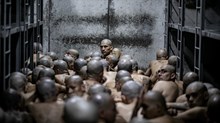South Sudan's referendum vote on Sunday could put U.S. diplomacy to the test as it attempts to ensure peace between two sides.
The Economist reports that President Obama paid less attention to Sudan than former President Bush until mid-2010, when he tripled the number of American officials in South Sudan's capital and sent envoys to the country's current capital to pressure northern Sudan leaders. If South Sudan votes to secede, as expected, it will set off a potentially difficult six-month transition.
Sudan observers are concerned that the vote could cause more tension in the region, said Kimberly Smith, president of Make Way Partners, which runs an orphanage and girls' home for trafficking victims in Sudan.
"I don't think there's going to be a fair and equitable election, and that will cause a fight in and of itself," said Smith, who recently authored Passport through Darkness. "People are deceived and think the conflict is over, their attention goes somewhere else."
Just before Christmas, Obama called southern Sudan leader Salva Kiir to reaffirm U.S. support for the referendum. The Obama administration said that it will remove Sudan from a list of state sponsors of terrorism if it honors the peace accord.
Northern Sudan's political leaders are publicly suggesting that they would accept an independent southern Sudan, which Sen. John Kerry called "extremely encouraging." "They're very positive, very constructive, and I think it sets a good stage for the events that begin in the next days," said Kerry, who is visiting the region for a week.
In order to be valid, the referendum requires that 60 percent of those registered turn out to vote.
"We think that it will reflect the will of the people, that it will occur on time, peacefully, and in a well-organized manner," Johnnie Carson, the assistant secretary of state for African affairs, told reporters.
In March 2009, the International Criminal Court issued an arrest warrant for President Omar Hassan al-Bashir, who faces charges of coordinating war crimes in Darfur. Bashir subsequently kicked out several humanitarian agencies.
During his campaign, Obama suggested implementing no-fly zones and called former President Bush's attempts to normalize relations "reckless and cynical," but his policy appeared to shift to a softer approach after the election.
"For the first year and a half of the Obama administration, it was disappointing that officials didn't live up to promises during the campaign," said John Prendergast of The Enough Project. Prendergast is working with George Clooney and Googleto monitor potential battlefields by satellite imagery. "The last few months in 2010 saw a real intensification of effort, mostly for the North/South issues. That's been encouraging to see a much more engaged and involved President and secretary of state."
A previous envoy to Sudan during the Bush administration says that advocacy groups have had to shift their criticism from focusing on Northern leadership receiving justice for the past.
"We aren't going to be able to force the North to do what we want to it to do," said Andrew Natsios, now a professor at Georgetown University. "We should strengthen the South instead of bashing the North all the time."
Obama's special envoy: the son of missionaries
The United States will recognize South Sudan's new government and appoint an ambassador if voters choose to secede in Sunday's referendum, U.S. officials told Reuters. The six-month transition period will revolve around key issues, including borders, citizenship, and oil ownership.
Helping lead some of the efforts is the Obama administration's special envoy for Sudan, Air Force major general J. Scott Gration, the son of missionaries.
Gration's earlier remarks were scrutinized by advocacy groups. "We've got to think about giving out cookies," The Washington Post quoted Gration as saying in September of last year. "Kids, countries—they react to gold stars, smiley faces, handshakes, agreements, talk, engagement."
The United Nations estimates that at least 2 million people were killed during the conflict between the regions and 4 million others were displaced.
"It really doesn't matter what we call the past," Gration told Christianity Today. "Many people's perspectives are frozen around 2003 to 2005. They finished 23 years of war in 2005 when the Comprehensive Peace Agreement was signed."
That Comprehensive Peace Agreement laid the groundwork for southern Sudan to hold a referendum in January 2011 on whether it should remain as a part of Sudan or become independent. If it becomes an independent state, it threatens to take wealth gleaned from oil from northern Sudan. Gration said Christians need to think about foreign policy with less black and white labels.
"While it's useful and fun to think of things just in terms of good and evil, not every situation is just good and evil," he said. "Some sanctions have limited our ability to do development and to bring some supplies that would be useful to helping the very people we're trying to help move forward."
Gration's parents were missionaries with Africa Inland Mission in Congo. The family was forced to evacuate during that country's fight for independence.
"The fact that we lost our worldly possessions helped me loosen my grip on material things and maybe have a tighter grip on higher callings and spiritual things," Gration said. His Christian faith, Gration says, holds a strong part in his life.
"Every morning I get up and look at the prayer of St. Francis of Assisi: 'Lord, where there is hatred, let me sow peace, where there is darkness, let me sow light, where there is despair, let me bring hope,'" said Gration, who attends Montclair Community Church, a nondenominational church in New Jersey. "It's a prayer that I try to live out every day. It captures what I believe my role on earth is, not only in my relationship to Sudan, but in my relationship with other people."
Gration sees his foreign policy as straightforward from Obama's directive.
"It's not a faith-based doctrine," said Gration, who will be in Sudan for the vote. "The values I've been brought up with certainly come into play, but not directly in terms of policy formation. But in terms of implementation, I think my country expects me to have integrity. It expects me to treat the people I deal with, with respect."
Copyright © 2011 Christianity Today. Click for reprint information.
Related Elsewhere:
See Tony Carnes' article on reconciliation, David Neff's column about praying for Sudan, and Moses Wasamu's article about constructing peace in Sudan.
Christianity Today has a special section on Sudan.
Previous CT articles on Sudan include:
Swoope-ing in to Sudan for Orphans' Sake | Profits from rapper's single will help build an orphanage in war-torn country. (December 11, 2010)
Pray for the Peace of Sudan | The World Evangelical Alliance's Geoff Tunnicliffe talks about efforts to ensure a fair and peaceful election in Sudan and calls for a world day of prayer for the safety of believers there. (November 22, 2010)
Suffering in Sudan | Church leaders ask for prayer and advocacy at Cape Town 2010. (October 23, 2010)
Election Jitters | Sudanese Christians hope nation will hold together until 2011 referendum. (April 6, 2010)

Support Our Work
Subscribe to CT for less than $4.25/month


















